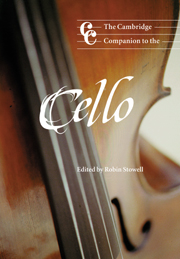Book contents
- Frontmatter
- 1 The cello: origins and evolution
- 2 The bow: its history and development
- 3 Cello acoustics
- 4 Masters of the Baroque and Classical eras
- 5 Nineteenth-century virtuosi
- 6 Masters of the twentieth century
- 7 The concerto
- 8 The sonata
- 9 Other solo repertory
- 10 Ensemblemusic: in the chamber and the orchestra
- 11 Technique, style and performing practice to c. 1900
- 12 The development of cello teaching in the twentieth century
- 13 The frontiers of technique
- Appendix: principal pedagogical literature
- Glossary of technical terms
- Notes
- Select bibliography
- Index
6 - Masters of the twentieth century
Published online by Cambridge University Press: 28 September 2011
- Frontmatter
- 1 The cello: origins and evolution
- 2 The bow: its history and development
- 3 Cello acoustics
- 4 Masters of the Baroque and Classical eras
- 5 Nineteenth-century virtuosi
- 6 Masters of the twentieth century
- 7 The concerto
- 8 The sonata
- 9 Other solo repertory
- 10 Ensemblemusic: in the chamber and the orchestra
- 11 Technique, style and performing practice to c. 1900
- 12 The development of cello teaching in the twentieth century
- 13 The frontiers of technique
- Appendix: principal pedagogical literature
- Glossary of technical terms
- Notes
- Select bibliography
- Index
Summary
Around the turn of the century, the German school was still at the forefront, its two leading figures being Julius Klengel and Hugo Becker, both representatives of the Dresden school in a direct line from Grützmacher. Despite their shared inheritance of the need for serious interpretation and rejection of the over-Romantic virtuoso style, they were totally different in their concepts of teaching; Klengel's approach was empirical, whereas Becker concentrated more on scientific aspects.
Klengel was born in Leipzig into a family of professional musicians; his first lessons were with Emil Hegar, principal cellist of the Gewandhaus Orchestra. From early childhood he played chamber music with his siblings, and at fifteen joined the Gewandhaus orchestra, succeeding his teacher as principal cellist at the age of twenty-two; the same year he was appointed ‘Royal Professor’ at the Leipzig Conservatoire. Klengel also appeared as a soloist in Germany and in Russia, where he gave the first performance in that country of Haydn's D major Concerto (1887); but he will go down in history for his remarkable teaching gifts. Paul Grümmer, Emanuel Feuermann, Guilhermina Suggia, Edmund Kurtz and William Pleeth are among his most famous pupils. Klengel never encouraged his students to copy, but always helped them to find their own way of playing; thus they were all individual in their approach. Klengel was also a composer who wrote imaginatively for the cello: his works include several concertos and a Hymn for Twelve Cellos, dedicated to the memory of the conductor Arthur Nikisch.
- Type
- Chapter
- Information
- The Cambridge Companion to the Cello , pp. 73 - 91Publisher: Cambridge University PressPrint publication year: 1999



